
23 minute read
the table
BRIAN BROSE

Advertisement
THE BOSS: PPA president Daryl Turner, 61, will step down in November after 10 years atop the union.
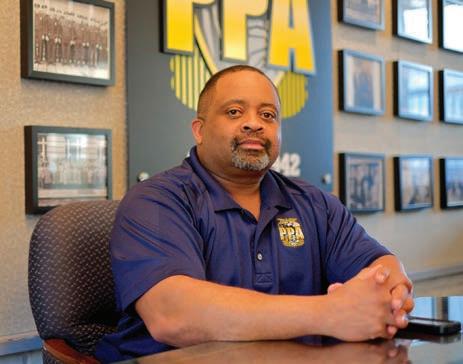
Portland Police Chief Jami Resch, a white woman who started in the job just six months ago, stepped aside and ceded command to Lt. Chuck Lovell, a Black man.
The changes are dramatic. And they might be just the beginning.
The Oregon Legislature today begins a special session aimed at police reform. Within the month, Oregon lawmakers could revamp the arbitration system that has shielded officers from firings after incidents of deadly force. They also want to create a statewide database of disciplinary findings against police; make cops mandatory reporters—on each other; and move investigations of police-involved shootings from local jurisdictions to the Oregon Department of Justice.
Portland has witnessed repeated controversial actions by police over the years, many of them against Black people. None of them catalyzed much real change. But George Floyd’s death in Minneapolis last month outraged the consciousness of millions of people for whom prior killings barely registered.
“It’s not just Portland,” says state Sen. Lew Frederick (D -Portland), the co-sponsor of a raft of police reform bills. “It’s happening around the country and around the world.”
Standing in their way: the 900 members of the Portland Police Association.
“We’re not the evil empire, and I’m not the emperor of the evil empire,” says PPA president Daryl Turner. “There is the perception that the PPA and Daryl Turner have some kind of magic dust that we throw on people, and then all of the sudden they do what we want them to do. I don’t see it as the power we have retained. I see it as reasonability.”
Reform advocates say the Portland Police Association has outmaneuvered City Hall at every turn: at the bargaining table, in the Legislature, and in court.
Over and over again, the PPA has zealously protected the interests of its officer members. For middle-class residents of the whitest city in America, the fact that those interests sometimes trampled on the rights of people of color, the mentally ill and the homeless was mostly an afterthought.
It’s worth noting that City Hall has been willing to dramatically revamp agencies with performance issues around race. An example: the Portland Development Commission, now called Prosper Portland. Years ago, the city recognized the role the PDC played in hollowing out Black neighborhoods, and City Hall gutted its budget and shifted its focus as a result.
“The PDC did a bunch of really bad things, and so they went through a major overhaul that is still ongoing,” says Felisa Hagins, political director of Service Employees International Union Local 49. “The Portland Police Bureau has been shooting Black and mentally ill people for decades, and fuck-all has been done.”
Why is that? We interviewed more than a dozen people about how the Portland Police Association has retained its power for so long in a city that doesn’t exactly love cops. Here’s what we learned.
The Portland police union frightens elected o cials. Soon after Mayor Bud Clark took office in January 1985, he invited Stan Peters, the longtime police union boss, to meet in his office at City Hall.
Clark was a free-spirited tavern owner with no political experience who beat incumbent Mayor Frank Ivancie in a shocking upset in 1984. One of Ivancie’s last significant acts before leaving office was agreeing to a 10 percent pay hike for the police.
Clark, now 88, remembers the meeting vividly.
“The first thing Stan Peters did was reach around behind him, pull out his gun from underneath his shirt, and put it on the table between us,” Clark recalls. “It was him establishing, ‘Hey, I’m Stan Peters, you better pay attention to me.’ And I think he did it every time I ever met with him.”
The PPA is the longest continuously operating police union in the country. Since its founding in 1942, it’s played hardball. Its current leader hasn’t held back from releasing fiery statements about the state of the city, and calling out elected officials by name.
“In July 2018, I said our city was becoming a cesspool, and today I stand by that assessment; our once vibrant city is on the wrong track,” Turner wrote in January, ahead of his union’s impending contract negotiations with the city.
MAYOR PUBLICAN: Mayor Bud Clark saw high-profile police firings overturned by arbitrators.
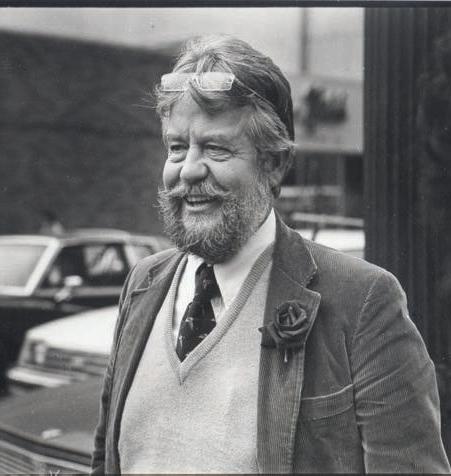

BRIAN BROSE


The approach appears to have been effective. Violent crime remains in a 30-year downtrend, yet the number of officers has remained about the same. The Police Bureau budget continues to account for by far the largest share of the city’s general fund.
And almost all of that money goes to labor—primarily rank-and-file members of the Portland Police Bureau.
“They are very powerful at protecting what they have,” says Joe Baessler, political director of the American Federation of State, County and Municipal Employees Council 75. “They get really aggressive and they go hard. Nobody wants to try to fight with them.”
There’s another reason the union is so entrenched: rapid turnover at the top.
When Chief Lovell took command of the Police Bureau earlier this month, he became the bureau’s eighth chief in 10 years. That churn is nothing new: Clark had five chiefs in his eight years as mayor.
“Chiefs come and go like itinerant laborers,” says state Rep. Jeff Barker (D-Aloha), a retired cop who served as PPA president in 1995-96. “But the union is always there.”
But the union’s power is limited. Although the Police Bureau accounts for the largest share of the city’s general fund budget, that doesn’t translate into what unions want most: jobs.
While the PPA has kept staffing at the bureau steady, Portland has far fewer sworn officers per capita than similarly sized cities. It’s got about one-third the staffing per capita of cities in the Northeast and little more than half the national average of staffing in cities with populations of more than 250,000.
Nor, for all its muscle, is the PPA a force at the ballot box like other unions that wield enormous influence on state and local politics.
The police union doesn’t have much money to spend— typically about $30,000 in an election year. (SEIU Local 49 spent more than twice that on a single expenditure for former Mayor Sam Adams’ race for City Council in the May primary.)
And while candidates in city races compete aggressively for endorsements by SEIU, AFSCME and the Portland Association of Firefighters, few seek the PPA’s endorsement.
The Reverend Dr. LeRoy Haynes, a longtime civil rights advocate and co-chair of the Albina Ministerial Alliance’s Coalition for Justice and Police Reform, says PPA’s
LOSING CLOUT: Budget cuts ended the bureau’s school resource ocer, transit police and Gun Violence Reduction Team units.
endorsement hasn’t helped candidates in recent cycles. “Anybody they support ended up losing,” Haynes says.
In recent weeks, Mingus Mapps, who is challenging Commissioner Chloe Eudaly in November, has tried to distance himself from the union’s endorsement he accepted in the May primary.
“I think it’s hard,” says SEIU’s Hagins, “to take a progressive stance and also say you are standing with the police union.”
The PPA is good at one thing—keeping its members from getting fired. In arbitration involving officers who’ve been fired for shooting people, PPA almost always wins. That’s gone on for decades.
In 2010, Officer Ronald Frashour fatally shot Aaron Campbell, who had earlier held his family at gunpoint but was found unarmed when Frashour shot him in the back.
Then-Chief Mike Reese, with the backing of Mayor Sam Adams, fired Frashour.
Adams wanted to end the city’s losing streak.
But after a 16-day hearing, an arbitrator found the shooting “objectively reasonable,” the key phrase from a 1989 U.S. Supreme Court case, Graham v. Connor, that is the yardstick for police use-of-force arbitrations.
Adams thought Frashour deserved to lose his job and convinced the rest of the City Council it should challenge the arbitrator’s decision. But the city lost twice more: at the state Employee Relations Board and then at the Oregon Court of Appeals, in 2015.
“It broke my heart and burst a blood vessel in my brain,” Adams says. “The whole thing was sad and infuriating and proof positive that the civilians who run the city of Portland do not have control over their Police Bureau.”
PPA has also displayed an uncanny ability to outfox anyone who seeks oversight of the bureau.
After the infamous Burger Barn incident in 1981 (see “Reinstated,” page 14), the City Council approved the formation of an independent police review panel. The PPA gathered enough petition signatures to refer the matter to the ballot but then lost in one of the closest elections in Portland history.
The Police Internal Investigations Auditing Committee set to work, but like the alphabet soup of oversight committees that still exist today, it didn’t lead to serious changes.
CHANGE AGENT: Ron Herndon says the police union only does what the City Council lets it do.
“City Council developed a toothless institution of oversight and never gave them enough authority,” says Ron Herndon, a longtime Portland advocate of racial justice and police reform.
Amanda Fritz, the longest-serving member of the City Council and the only one who is a dues-paying union member (of the Oregon Nurses Association), says the PPA’s power can be summed up in two words.
“The contract.”
She and other critics say specific terms in the PPA contract frustrate true oversight.
Every three years, the PPA sits down with the city to hammer out a new labor agreement. That document specifies work rules, discipline, compensation and other terms of officers’ employment.
Critics blame the 92-page contract for the union’s power. Haynes, for example, says City Hall cedes too much power at the bargaining table.
“The natural order of unions is to fight for their employees. But other unions don’t have the right to kill a citizen,” Haynes says. “It’s not just that they’re bargaining for wages. It is fighting against justice for the citizens.”
City Auditor Mary Hull Cabellero takes particular issue with two parts of the contract. First, investigators for what’s now called the Independent Police Review cannot compel officers’ testimony.
Second, in cases where the city does discipline an officer, it must do so “in a manner that is least likely to embarrass the officer before other officers or the public,” the contract says. This means almost all findings by IPR are cloaked in secrecy.
But for anyone focused on the most visible form of accountability—whether officers like Ron Frashour should get to keep their jobs even after they’ve been fired—the key provision is one that commits both sides to binding arbitration.
In Oregon, state law prohibits police officers from striking.
In return, the law allows their unions to appeal disciplinary decisions and contract disputes to arbitration. Article 22 of the PPA contract, “Grievance and Arbitration Procedure,” fills little more than two pages. Here are the words that matter: “The arbitrator’s decision shall be final and binding.”
In the decade that Turner has been president of the PPA, he says just four officers have gone to arbitration

WALL OF PAIN: A memorial to Black Portlanders, many killed by police, went up outside Revolution Hall.
“SNAPPY PUPPY”: That’s what the PPA called Commissioner Mike Lindberg for taking a union contribution and then pushing for reforms.

after being fired for misconduct. All four were reinstated.
The one-sided results go back a long time. “I think every firing of an officer was overturned when I was in office,” says former City Commissioner Mike Lindberg, who served from 1979 to 1996.
There are a number of contributing factors: Some say it’s because Police Bureau discipline is inconsistent, so arbitrators cannot uphold city decisions; others say it’s because the union has for decades employed attorneys who are laser-focused on police issues, whereas the city employs generalists.
But the bottom line is the standard: Was what the officer did “objectively reasonable”?
The arbitrator who reviewed Frashour’s shooting of Aaron Campbell summed up the enormously complicated case this simply: “Where the circumstances indicate that the subject could be armed and has indicated possible intent to use the weapon, then deadly force will survive the constitutional test.”
Turner says the public isn’t getting the full story. He says there have been about a dozen instances over the past decade in which officers have resigned or been fired after violating policies, and the union didn’t file a grievance or defend them in arbitration.
“And we’ve said, ‘You’re not a criminal, you’re not a bad person,’” Turner says. “‘However, you have just violated a policy that no longer allows you to be a police officer in the Portland Police Bureau.’”
Turner says the PPA wins in arbitration because it chooses its battles carefully. “If we go to arbitration, usually we’ve done our homework,” he says.
“They’ve got great lawyers,” Fritz acknowledges.
Over the years, the City Council grew accustomed to losing.
“Anything we did, it always seemed like there was a high likelihood to be overturned by an arbitrator,” says Saltzman, the city commissioner who once supervised the Police Bureau and served from 1999 to 2018. “We were always going to lose.”
Cops are untouchable because no one has changed the laws that protect them. Laws regarding officers’ use of force, arbitration, the release of public records and other matters that govern PPA members are made in Salem.
For most of the past decade, Sen. Frederick has been the only Black man in the Legislature. (Democratic Sen. James Manning of Eugene, who is also Black, was appointed in December 2016.)
Frederick has often struggled to convince his colleagues the reforms he’s proposed are necessary.
“It’s a question of what kind of experience you have had,” Frederick says. “The white experience is the norm.”
Frederick has tried without success to weaken the authority of arbitrators to reinstate fired cops, along with promoting greater disclosure of disciplinary findings and regular psychological check-ups for cops. He says his efforts often run into potent lobbying and a lot of what-aboutism.
“There’s always the excuse, ‘If we don’t let police keep doing what they do, chaos will occur,’” Frederick says. “Every major session, I’ve introduced a use-offorce bill. The response is always, ‘Does this mean cops can’t touch anybody anymore?’”
Frederick has enjoyed a few successes, including a 2017 bill aimed at stopping racial profiling by increasing training and collecting data about who gets stopped and why. But more often, Frederick has found that lawmakers would rather listen to lawmen—including the PPA—than him.
In Salem, the loudest voice for police is a statewide coalition of police and sheriff ’s deputies called ORCOPS, led by its president, the PPA’s own Daryl Turner. ORCOPS has regularly opposed reforms and, most of all, making changes to the arbitration process.
Even under Democratic control of the Legislature, police have also had a powerful friend atop the House Judiciary Committee, which hears virtually all criminal justice bills: Barker, the former PPA president, served as House Judiciary chairman from 2007 to 2019. Five incidents indelibly shaped the relationship between the city’s Black community and the Portland Police Bureau. In four of them, officers were fired but got their jobs back. In the fifth, no cops lost their jobs. TESS RISKI.
THE BURGER BARN (1981) On March 12, Officers Craig Ward and James Gallaway threw four dead opossums in front of a Black-owned North Portland restaurant called the Burger Barn. The city erupted in protest, and Commissioner Charles Jordan, the first Black man to serve on the City Council and as police commissioner, fired the officers. Hundreds of officers and their families marched on City Hall. An arbitrator ordered the city to give the officers their jobs back, and Mayor Frank Ivancie stripped Jordan of the Police Bureau.
LLOYD “TONY” STEVENSON (1985) On April 21, Lloyd “Tony” Stevenson was shopping at a Northeast Portland 7-Eleven when he helped a store clerk fend off a robber. Stevenson, an off-duty security guard and father of five, then got into a fight with a witness in the parking lot. A white Portland police officer, Gary Barbour, responded to the scene and placed Stevenson, who was Black, in a chokehold. Stevenson collapsed and died 45 minutes later at the hospital. On the day of Stevenson’s funeral, two white officers, Paul Wickersham and Richard Montee, handed out T-shirts to fellow cops. The shirts depicted a smoking handgun with the words “Don’t Choke ’Em, Smoke ’Em.” Mayor Bud Clark fired Wickersham and Montee, but an arbitrator overturned the firings and they got their jobs back.
KENDRA JAMES(2003) On May 5, Portland police pulled over a vehicle in which Kendra James, a 21-year-old Black mother of two, was a passenger, because it failed to make a complete stop at a stop sign. After police arrested the driver on an outstanding warrant, James jumped into the driver’s seat and attempted to drive away. As the car rolled forward at what eyewitnesses described as a walking pace, Officer Scott McCollister shot James in the hip. Police pulled James out of the car and handcuffed her. As she lay dying on the ground, the police set up crime scene tape and did not check her vital signs. McCollister was placed on unpaid leave, and an arbitrator later determined that McCollister did not violate police policy when he killed James. He was reinstated with back pay.
AARON CAMPBELL(2010) On Jan. 29, Aaron Campbell was holed up with his girlfriend and children in an apartment at Northeast 128th Avenue and Sandy Boulevard. A caller told 911 that Campbell was armed and suicidal. Campbell let the others in the apartment go and told an officer via text message that he was coming out. He walked out with his hands behind his head but refused to raise them. An officer shot him with a beanbag round, and Campbell ran. Officer Ron Frashour shot him fatally in the back, later saying he thought Campbell, who was Black, was reaching for a gun. No gun was found. Chief Mike Reese and Mayor Sam Adams fired Frashour, but an arbitrator and, later, the Oregon Court of Appeals ordered him reinstated. The city of Portland paid Campbell’s family a $1.2 million settlement.
KEATON OTIS (2010) On May 12, 25-year-old Keaton Otis was driving his mother’s Toyota Corolla in Portland’s Lloyd District. Police pulled him over because he failed to signal a turn and because the young Black man looked “like a gangster,” The Oregonian reported. Four patrol cars surrounded Otis, and officers ordered him to put his hands on his head. Police testified that Otis, who suffered from mental illness, grabbed the steering wheel while screaming profanities. The officers said Otis reached for a Crown Royal bag that contained “something bulky” before shooting one of the officers, Chris Burley, twice. Burley and the three other officers—Cody Berne, James Defrain and Ryan Foote—fired 32 shots at Otis, hitting him 23 times. A Multnomah County grand jury found the officers’ use of force was justified, and Internal Police Review said the shooting was “within policy.”

“He has stopped a number of the bills I’ve put forward,” Frederick says. “He has also been effective in supporting many of the bills I’ve passed.”
But last year, House Speaker Tina Kotek (D-Portland) yanked Barker’s gavel, a decision he attributes to his opposition to ending the state’s death penalty.
Change may be coming. The well-oiled machine that is the Portland Police Association may soon have sand in its gears.
“This is the first time I’ve seen the power of the people having more influence over legislators and City Council than the police,” says Portland civil rights lawyer Jason Kafoury.
After weeks of national uprisings in George Floyd’s memory, Frederick thinks lawmakers will be more willing to listen to reforms he and the coalition of Black, Indigenous and People of Color Caucus will introduce June 24.
“We didn’t have visual evidence before. It was somebody’s word against the cops,” Frederick says. “We now have evidence that it’s not somebody making things up.”
The most watched bill will be their effort to reduce arbitrators’ leeway to reverse discipline, including firing of police officers.
Turner has fought changes to the arbitration process fiercely and says the new legislation cannot tinker with the matrix of discipline his union negotiates with the city. He wants a clear, consistent process, which he says will dispel the biggest misperception about the PPA, “that we protect bad cops.”
Previous versions of the arbitration bill were much broader, and a variety of union interests opposed them, both in 2019 and during the truncated short session earlier this year.
Baessler of AFSCME says there’s not likely to be opposition from other unions this time. “I think we will be supportive if the bill is sufficiently specific,” he says.
In 2019, Speaker Kotek allowed an earlier version of the arbitration bill to die. Barker says that won’t happen this time. He expects the bill to pass.
“They are essentially doing away with arbitration,” Barker says. “The police will try to amend it, but Tina Kotek is not interested in that.”
Kotek expressed strong support on Twitter. “I’m all in,” she tweeted June 11. “Let’s get to work and make this happen.”


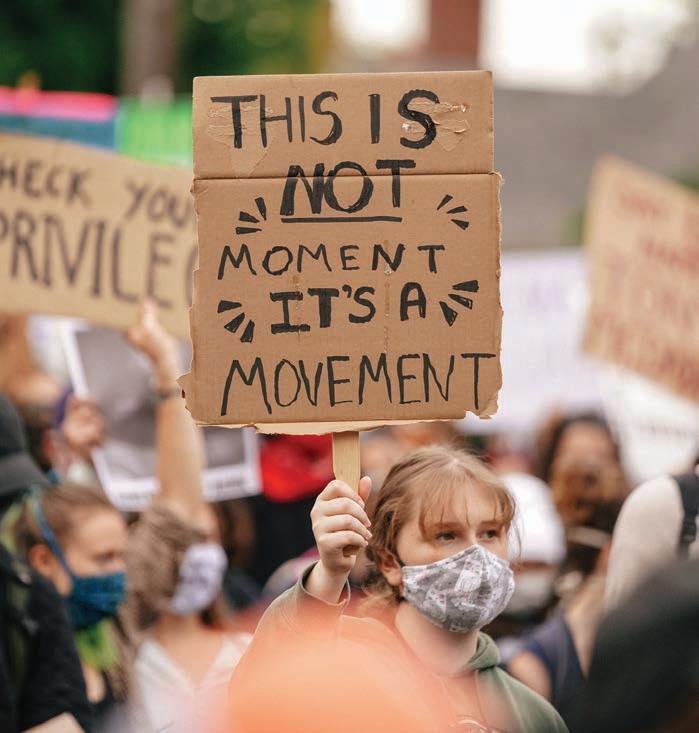
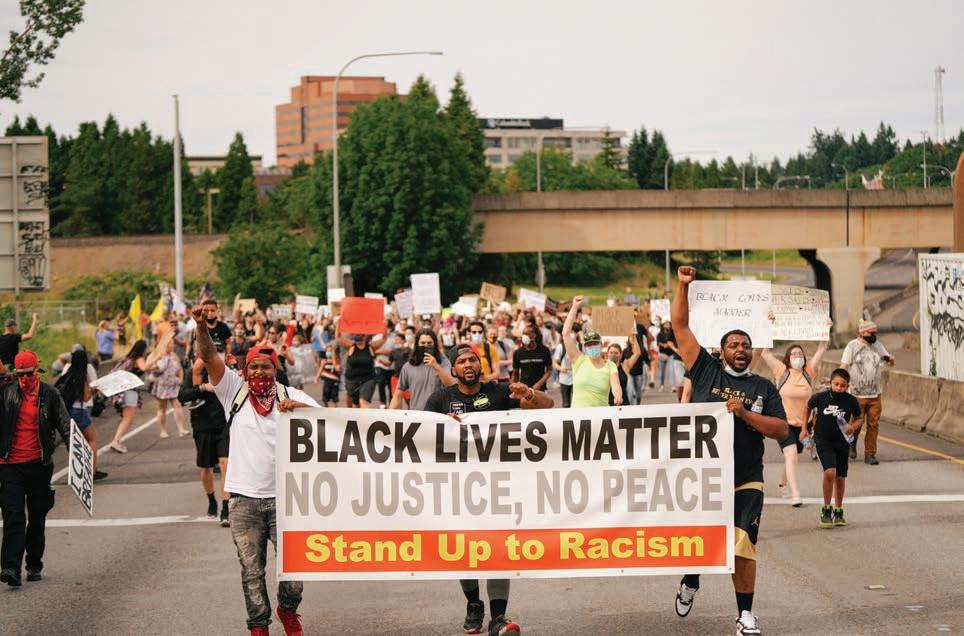


BRIAN BROSE
ALEX WITTWER BRIAN BROSE
JUNETEENTH
As the Juneteenth holiday—which marks the end of slavery in the United States—coincided this year with national protests of racism and police violence, Black Portlanders rejoiced, mourned and organized in the city’s parks and streets and on its bridges. At least a half-dozen marches were held across the city, some overlapping. The day began with the image of a toppled statue of George Washington, a slaveholder, along Northeast Sandy Boulevard. It expanded into a celebration of Black lives in all quadrants. These photos show a small slice of the day’s events. ALEX WITTWER.


BRIAN BROSE
BRIAN BROSE



ALEX WITTWER

ALEX WITTWER
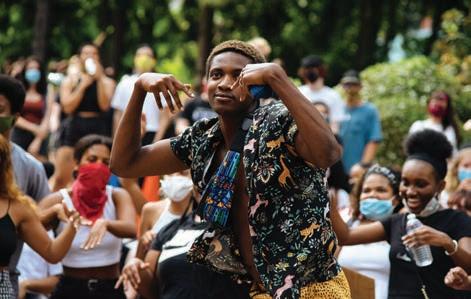

ALEX WITTWER


ALEX WITTWER

BRIAN BROSE
BRIAN BROSE

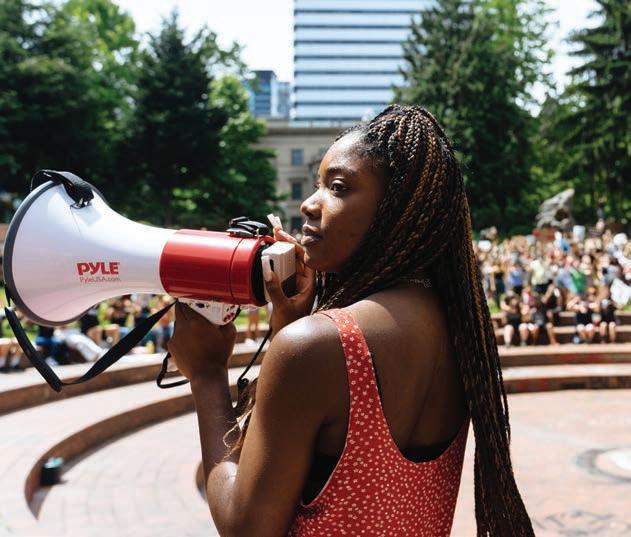

THE NAMESAKE OF FLORENCE’S EXPLODING WHALE PARK.



THE BLUBBER HITS THE ROAD
The most absurd and gory piece of Oregon history has been commemorated by the residents of Florence, Ore.: An outdoor recreation site along the Siuslaw River is now named Exploding Whale Memorial Park. Residents of Florence voted on the name last year, and anointed the park with a new sign last week. In case you missed it: In November 1970, an 8-ton, dead and decaying sperm whale washed up on a Florence beach. It was too big to simply bury and posed a public health risk. Thinking it would be easier to dispose of the sea mammal if it was in smaller pieces, state o cials decided to blow it up using dynamite. It…didn’t go well. The Register-Guard wrote of “a 100-foot-high column of sand and whale,” and that “chunks of the animal fl ew in every direction, and spectators began to scream and run for cover when they glimpsed large pieces soaring directly overhead.” Clearly, the residents of Florence have a sense of humor and pride: In a public poll, “Exploding Whale Memorial Park” won a landslide victory over more picturesque names like “Dune View Park” and “Little Tree Park.” The community also created a mascot for the exploding whale’s 50th anniversary: an adorable, totally intact whale named Flo.
DINNERS AND A MOVIE
Ten restaurants across the state providing free meals during the coronavirus pandemic have received thousands of dollars to keep up those e orts—thanks in part, to a quirky, locally produced fi lm that was No. 1 at the box o ce in April. The Oregon Hospitality Foundation announced it is granting funds to businesses that created programs to feed everyone from frontline workers to the fl ood of restaurant employees who lost their jobs following the statewide ban of in-person dining. The fi nancial gifts went to a range of businesses, including, in the Portland area, the Toro Bravo Restaurant Group, Portland Mercado, and the Botanist House. The restaurants had an unusual partner: Phoenix, Oregon, an independent movie that briefl y held the top spot at the box o ce two months ago due to the fact that, well, it had no competition. A screening of the fi lm launched the OHF’s new fundraising event, Takeout & A Movie, which was followed by a Q&A with the directors and actors. Ticket sales, a donation from the Grubhub Community Relief Fund, and other contributions brought in enough money for an estimated 11,500 meals.
SOCIAL DISTANCE DRINKERS
Oregonians spent the spring drinking alone, but sales fi gures show they still slaked their thirst. Liquor sales to individuals in Oregon increased by 45% between May 2019 and May 2020, new data from the Oregon Liquor Control Commission shows. That marks the third month in a row that monthly liquor sales have increased by more than 40% compared to the same month last year, thanks chiefl y to the statewide closure of bars. In May 2019, individual consumers statewide spent $43.5 million on liquor. This May, they spent $63.2 million. While retail sales to consumers continue to spike, sales to liquor licensees like bars, restaurants and social clubs have continued to decline as those establishments remained closed during the statewide shutdown: In May, sales to licensees dropped 86.6%, from $13.9 million last year to $1.9 million this year. It’s unclear how liquor sales to individuals and licensees will be a ected in the coming months, as restaurants and bars statewide reopen and Oregonians are no longer relegated to drinking at home only.
ROUND DOWN
After months of deliberation, this year’s Pendleton Round-Up—Oregon’s largest rodeo—has been canceled due to COVID-19. It’s only the third time the rodeo hasn’t taken place since it was founded in 1910, and the fi rst time it’s been canceled since World War II. “’Let’er Buck’ & ‘On with the show’ is in our DNA,” reads a statement on the Round-Up’s website. “We are comforted knowing our community is not being put in harm’s way with the novel coronavirus, for that would be a burden we could not bear.” Those who bought tickets to this year’s Round-Up can either get a refund, roll their tickets over to the 2021 rodeo, or donate to the Let’er Buck Cares Fund, which will support organizations fi nancially impacted by the cancellation.










